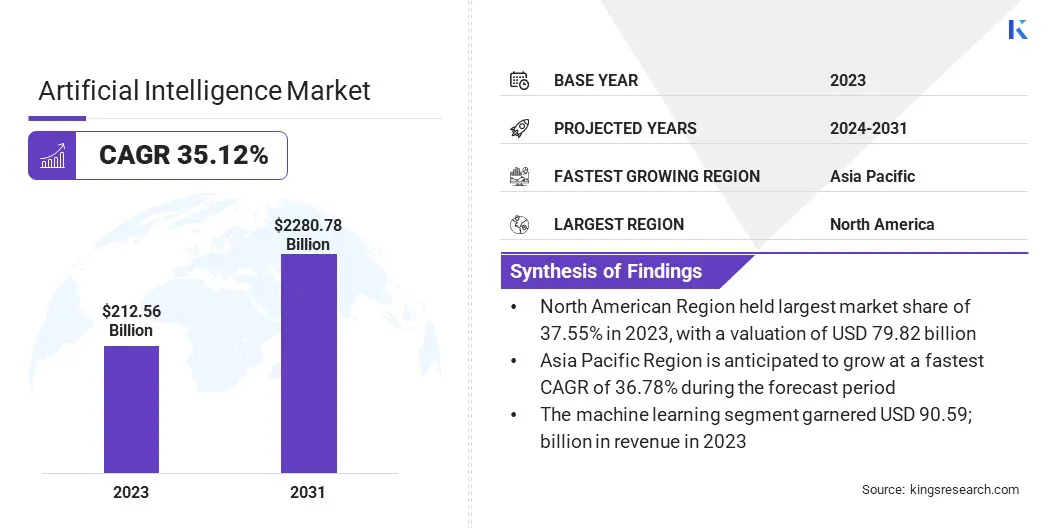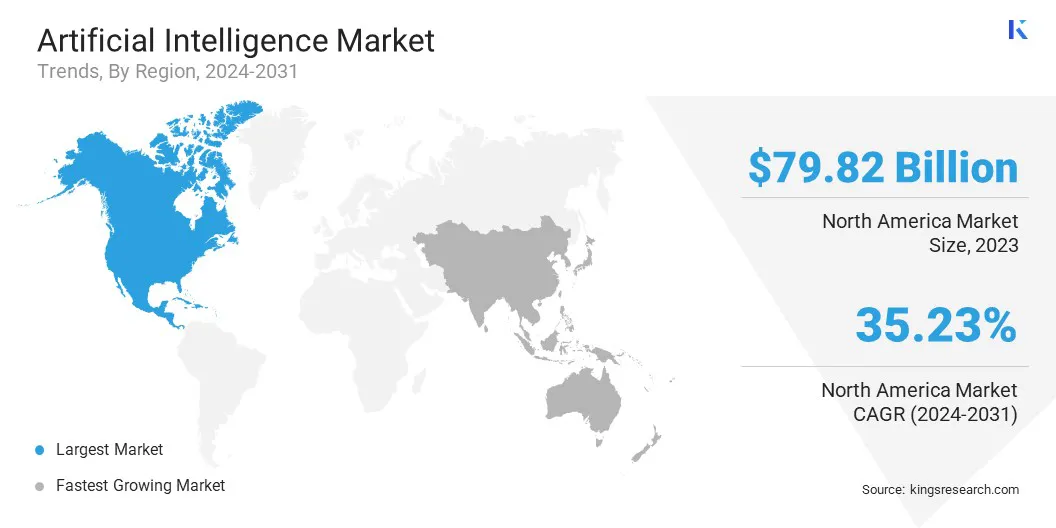Buy Now
Artificial Intelligence Market Size, Share, Growth & Industry Analysis, By Solution (Hardware, Software, Services), By Technology (Machine Learning, Natural Language Processing, Deep Learning, Others), By Company Size (Small, Medium, Large Enterprises), By End-Use and Regional Analysis, 2024-2031
Pages: 190 | Base Year: 2023 | Release: January 2025 | Author: Ashim L.
The global Artificial Intelligence Market size was valued at USD 212.56 billion in 2023 and is projected to grow from USD 277.41 billion in 2024 to USD 2280.78 billion by 2031, exhibiting a CAGR of 35.12% during the forecast period.
The rapid growth of the market is attributed to ongoing advancements in deep neural networks (DNN), the exponential growth of big data, the rise of cloud computing platforms, and increased adoption of AI across industries. Additionally, significant investments from governments, venture capitalists, and other investors are supporting this growth.
In the scope of work, the report includes products offered by companies such as Apple Inc., Microsoft, NVIDIA Corporation, Alphabet, Open AI, Tesla, Adobe, IBM, Amazon Web Services, Meta, and others.
The artificial intelligence market presents numerous opportunities across various sectors, driven by rapid technological advancements and growing demand for AI solutions. Companies are making substantial investments in AI infrastructure and developing skilled workforces to advance research and development.
AI is being increasingly utilized across industries to automate tasks, analyze large datasets for insights, and deliver personalized customer experiences, thereby bolstering market growth.
Artificial intelligence (AI) refers to the simulation of human intelligence in machines, enabling them to perform tasks such as learning, reasoning, and self-correction. Key technologies in AI include deep learning, machine learning, natural language processing, and computer vision.
AI is rapidly transforming industries such as healthcare, finance, transportation, and entertainment by automating tasks, improving efficiency, and fostering innovation.

The artificial intelligence (AI) market is experiencing rapid growth, mainly fueled by the integration of AI tools into established businesses and the rise of AI startups offering specialized solutions. To effectively capitalize on this demand, companies are investing in advanced technologies and developing a skilled workforce to accelerate innovation and expand market reach.
For instance, e-commerce companies are adopting natural language processing (NLP) to improve human-computer interactions, such as through chatbots and virtual assistants, enhancing customer service.
Furthermore, the artificial intelligence market has witnessed a rise in strategic alliances and collaborations among established players, AI startups, and research institutions to accelerate innovation and enhance operational efficiency. Moreover, companies are emphasizing ethical considerations and data protection in response to evolving regulatory landscapes and legislative actions.
The exponential growth of the global artificial intelligence market is largely attributed to technological advancements. Key areas such as generative AI, machine learning, and facial recognition technologies have witnessed substantial progress.
This is due to continuous innovation in machine learning (ML), deep learning (DL), natural language processing (NLP), computer vision (CV) algorithms and others. Numerous companies and startups are leveraging NLP to develop generative AI systems, which are growing popularity among students and professionals.
Furthermore, cloud-based storage has improved access to structured, unstructured, and historical data, leading to advancements in AI model training and innovation. AI models rely on large volumes of historical data to identify patterns and make accurate predictions. This enhanced data accessibility is contributing significantly to the growth of the artificial intelligence market.
Ethical concerns and data quality issues are presenting significant challenges to the expansion of the market. The effectiveness and impartiality of AI systems rely on the data used for training. If these data sets reflect existing societal biases related to gender, race and others, then the AI's algorithmic outputs may reinforce these biases.
To address these challenges, AI companies are actively developing ethical guidelines and implementing bias detection models to ensure the quality and accuracy of training data, thereby mitigating these risks and fostering responsible AI development.
The increasing demand for AI-powered solutions across various industries, including BFSI, healthcare, IT and others, has spurred the growth of the artificial intelligence market. The availability of big data and open-source technologies has enabled developers and entrepreneurs to develop AI applications.
This has attracted substantial investments from venture capitalists, governments, and corporations, thereby fueling market expansion and fostering the emergence of new AI companies.
Generative AI models are rapidly advancing, mainly due to their applications in content creation, customer service, and software development. There is a growing focus on developing specialized models tailored to specific industries, such as medical diagnosis or drug discovery.
AI-powered tools are capable of analyzing medical images, detecting anomalies, and assisting in the diagnosis of diseases such as cancer and Alzheimer's.
Technological advancements have led to the widespread use of artificial intelligence in the financial sector for applications such as high-speed trade execution, fraud detection and prevention, and investment risk assessment. Major banks are deploying AI models to analyze financial data and create sophisticated valuation models, facilitating informed investment decisions.
The global market has been segmented based on solution, technology, company size, end-use, and geography.
Based on the solution type, the artificial intelligence market has been categorized broadly into hardware, software, and services. The software segment accounted for the largest revenue share of 48.51% in 2023 due to its innovation, scalability and flexibility. This segment encompasses tools and platforms that support the development, deployment, and management of AI applications.
Developers use machine learning frameworks (TensorFlow, PyTorch, scikit-learn), NLP platforms, and CV libraries to create solutions for specific business needs such as customer relationship management (CRM), fraud detection, and supply chain optimization.
Based on the technology, the market has been broadly categorized into machine learning, natural language processing, and others. The deep learning segment is anticipated to grow at a staggering CAGR of 36.76% through the forecast period. Deep learning, inspired by the human brain, utilizes artificial neural networks with multiple layers to learn from data.
This technology underpins a wide range of Generative AI models, including chatbots and virtual assistants, contributing significantly to the growth of the segment.
Based on the company size, the market is broadly categorized into small, medium, and large enterprises. Large enterprises accounted for a significant share of 56.71% in 2023, owing to their substantial resources, advanced IT infrastructure, and established processes.
Large enterprises such as Apple, IBM, and NVIDIA leverage their financial strength to gain a competitive edge in the AI market. This enables them to invest significantly in AI research and development, acquire cutting-edge AI technologies, attract top talent, and build robust AI infrastructure.
Furthermore, their financial capacity to allows them to acquire smaller companies, integrating their technologies and fostering innovation.
Based on the application, the market has been segmented into healthcare, BFSI, automotive and transportation, retail, and others. The healthcare segment dominated the market in 2023, with a share of 35.22% and a revenue of USD 74.87 billion. Artificial intelligence (AI) is revolutionizing the healthcare industry by facilitating accurate diagnosis, streamlining operations, and enhancing patient care.
AI systems automate administrative tasks, including scheduling, billing, and claims processing, allowing healthcare professionals to dedicate a greater proportion of their time to patient care.
Furthermore, Medical hospitals and centers are widely utilizing AI-powered tools to accurately predict the early stages of diseases, such as breast cancer and cardiovascular diseases, thereby enabling early intervention and the timely initiation of treatment.
Based on region, the global market has been classified into North America, Europe, Asia Pacific, Middle East & Africa, and Latin America.

North America artificial intelligence market is expected to dominate the market, generating a revenue of USD 103.79 billion in 2024. North America has a well-established history of technological leadership, particularly in computer science and software development, fostering a conducive environment for AI research.
This has attracted top talent and fueled significant advancements in AI technologies. Major global companies such as Google, Microsoft, and Amazon are making substantial investments in AI research, development, and deployment. Furthermore, venture capital firms, corporations, and government agencies are actively funding AI startups and research initiatives, thereby fueling regional market growth.
The Asia-Pacific artificial intelligence market has emerged as the fastest-growing region in 2023, generating revenue of USD 43.81 billion. The region is projected to exhibit a robust CAGR of 36.78% from 2024 to 2031, largely due to rapid economic development, increasing digitalization, and government policies supporting AI companies.
Countries such as Singapore, China and others are investing heavily in AI startups and promoting data-sharing initiatives to accelerate the penetration of AI across different sectors.
The global artificial intelligence Market report will provide valuable insights with a specialized emphasis on the fragmented nature of the industry. Prominent players are focusing on several key business strategies, such as partnerships, mergers and acquisitions, product innovations, and joint ventures, to expand their product portfolio and increase their market shares across different regions.
Companies are implementing impactful strategic initiatives, such as expansion of services, investments in research and development (R&D), establishment of new service delivery centers, and optimization of their service delivery processes, which are likely to create new opportunities for market growth.
Key Industry Developments
The global artificial intelligence market has been segmented as:
By Solution
By Technology
By Company
By End-Use
By Region
Frequently Asked Questions